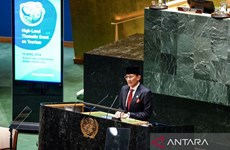Top 10 world economic events in 2022
 Engineer works at a gas treatment plant in Vadu, Romania. (Photo: AFP/VNA)
Engineer works at a gas treatment plant in Vadu, Romania. (Photo: AFP/VNA)Hanoi (VNA) – The global energy and food crisis, central banks’ interest rates hike to cope with inflation and the establishment of the COP27 “loss and damage” fund, were among the top 10 world economic events in 2022, as selected by the Vietnam News Agency (VNA).
1. World faces energy and food crisis
The
Russia-Ukraine conflict that broke out in late February 2022 has pushed up
global food and energy prices. Gas prices rose nearly five times on March 7
compared to before the conflict. The Food and Agriculture Organisation (FAO)
Food Price Index in March hit a new high of 159.3 points. The retaliatory
sanctions between the US, Europe and Russia have caused oil and gas supplies to
drop and their prices to rise sharply. Geopolitical tensions and natural
disasters have disrupted global supply chains, exacerbated inflation, and
resulted in growth slowdown.
2. Central banks hike interest rates to
cope with inflation
The US Federal
Reserve (Fed) on March 16 approved a 0.25 percentage point rate hike, the first
increase since 2018. In 2022, the Fed raised interest rates seven times to a
range of 4.25-4.5%, the highest since 2007. On July 21, the European Central
Bank (ECB) also raised interest rates for the first time in 11 years, and then
increased rates three more times that year. To ease
decades-high inflation, central banks have hiked interest rates after keeping
them close to 0% to support economic growth during the pandemic.
3. Euro falls below US dollar
The euro fell to
a two-decade low of 0.9880 against the US dollar due to Europe facing an energy
crisis and the risk of a serious economic recession amid the Russia-Ukraine
conflict. The interest rate gaps and government bond yields in the US and
Europe have prompted investors to shift from the euro to the US dollar.
4. COP27 agrees “loss and damage” fund to
tackle climate impacts
The 27th
Conference of the Parties to the United Nations Framework Convention on Climate
Change (COP27), which took place in Egypt from November 6-20, approved an
agreement on climate change, notably an initiative on the establishment of a
“loss and damage” fund, providing financial assistance for developing nations
stricken by climate change.
5. China’s 20th Communist
Party Congress adopts important economic decisions, policies
The 20th Congress
of the Communist Party of China in October 2020 was an important event for
China as the world’s second largest economy has embarked on building a modern
socialist country. One of China's most important tasks in the next five years
is to invest heavily in technology to modernise its economy and improve growth
quality.
6. OPEC makes largest production cut since
2020
Members of the
Organisation of the Petroleum Exporting Countries (OPEC) and OPEC Plus agreed
in Vienna, Austria, on October 5 to slash oil production by 2 million barrels
per day, equal to 2% of global supply from November 2022. This was the biggest
cut by OPEC Plus since April 2020 in a bid to shore up prices. The decision has
raised concern over oil supply, exacerbated inflation, and held back global
growth.
7. Global gold price sets new record
The world gold
price touched a record of 2,078.8 USD/ounce on March 8. Inflationary pressures
and geopolitical uncertainties have boosted investment demand in gold, which is
considered a safe haven. However, this upward trend did not last long as the
strong US dollar and the tendency to raise interest rates by major central
banks have made gold lose its shine.
8. Cryptocurrencies face uncertain future
One of the
world's biggest cryptocurrency exchanges, FTX, on November 11 filed for
bankruptcy protection in the US. Bitcoin on November 22 fell to 15,480 USD, its
lowest level over the past two years. Digital-asset lender BlockFi on November
28 also filed for bankruptcy protection in the US, citing FTX's collapse and
volatility in the crypto markets.
9. Global stock markets fall sharply
The MSCI All
Country World Index (MSCI ACWI), an international equity index, on June 6
dropped 21% from the record level set in November 21 to 597.64 points. Since
then, the world stock markets have fallen into a long-term downtrend amid high
inflation. The wave of sell-offs have been seen in stock markets globally as
investors worried that the Fed would move faster on interest rates. The
International Monetary Fund warned that the market would goes into
“hibernation” if the economic downturn worsens.
10. Billionaire Elon Musk buys Twitter
Billionaire Elon
Musk completed his 44 billion USD takeover of Twitter Inc on October 27. After the
purchase, he laid off 50% of staff and raised fees for users. His new
management policy has forced many partners to stop or suspend advertising on
Twitter. According to the Bloomberg Billionaires Index, a daily ranking of the
world's richest people, Musk’s dropped to 169.8 billion USD as of November 22,
losing 100.5 billion USD from earlier this year, which was an unprecedented
decline in wealth in Bloomberg's billionaire rankings./.











